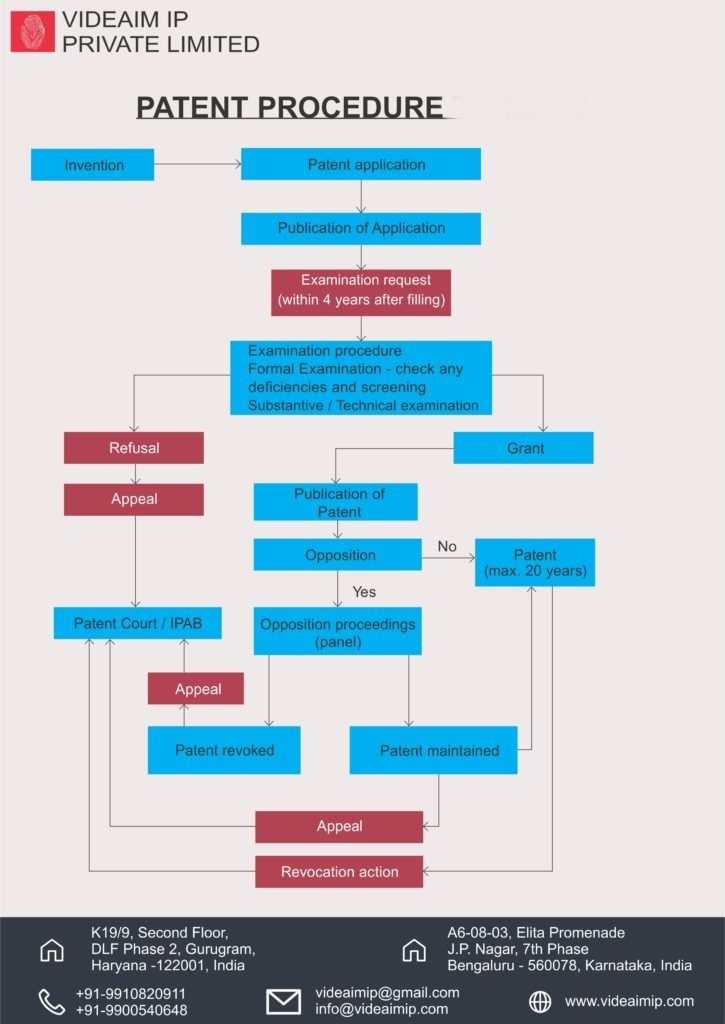This article provides an overview of the Indian patent procedure and timelines of a patent application in India.

Patent Application Filling
An application for patent can be filed under prescribed rules via Indian Patent Office website. Every application for a patent shall be for one invention only and accompanied with the prescribed fee, filed at an appropriate office.
All patent related procedures are carried out from Indian Patent Office functions at following locations :
- Kolkata
- Delhi
- Chennai
- Mumbai
It is important that an application for patent is filed with the Patent Office having appropriate jurisdiction.
Patent Publication
An application for Patent is not open to public before the expiry of 18 months from the date of filing or date of priority, whichever is earlier. At the end of 18 months period from the date of filing or from the date of priority whichever is earlier, the Application is published in the Official Journal.
However, if an early publication request is made, then a patent application will be published by the Indian Patent Office , generally, within 1 week from the data of receiving the request.
Patent Examination Request
Request for examination can be filed within 48 months from the priority date. The Indian Patent Office shall not examine a patent application, unless this request is filed. Hence, it is advised to make early examination request to expedite the patent process. The request is to be filed in Form 18 or Form 18A (as the case may be) along with the fee as prescribed.
Examination Procedure
On receipt of request for examination , the Office accords a date and serial number to it. Applications and other documents filed are digitized, verified, screened, classified and uploaded to the internal server of the Office. The Application is screened for:
- International Patent Classification
- Technical field of invention for allocation to an examiner in the respective field
- The Office checks whether the Application has been filed in appropriate jurisdiction
- The Office checks whether the application and other documents have been filed in the prescribed format i.e. 30 prescribed forms, request, petitions, assignment deeds, translation etc.
Further, the Office checks whether:
- the documents are prepared on a proper sized paper, typed in appropriate font with proper spacing,
- the documents are duly signed
- abstract, drawings (if any) have been filed in proper format
- meaningful claim(s) are present in a complete specification
- Authoristion of an Agent or in the form of a power of attorney
- whether, Form-5 has been filed, if required
Patent Grant
If the patent application satisfies all the requirement of patentability, then a patent is granted to the invention and subsequently published.
However, if the Indian Patent Office finds that the requirements of patentability are not met or any other formalities are not met, then a First Examination Report (FER) is issued. The examiner prepares the report after conducting a prior art search to ascertain the novelty, and examining as to whether the invention disclosed in the specification is inventive and industrially applicable.
First Examination Report (FER) may contain office objections relating to:
- Lack of novelty, inventive step and industrial applicability.
- Subject matter relating to a category, which falls within the purview of Sections 3 and 4.
- Non-fulfillment of any other requirement under the Act & Rules.
Reply to First Examination Report (FER)
It is required to comply with all the requirements imposed upon by the Examiner as communicated through FER , at the earliest. If applicant fails to respond to the FER, within six months from the date of issuance of FER or within an extended period of 3 months the application is deemed to have been abandoned. A communication to that effect is sent to the applicant for information.
Hearing at Intellectual Property Appellate Board (IPAB)
If the response / amendment filed by the applicant do not satisfy the requirements, the Controller offers an opportunity of hearing and decides the case on merits. A patent can not be refused without giving an opportunity of being heard under Section 14 Indian Patent Rules 2003.
Pre-Grant Opposition
Any person may file an opposition by way of representation to the Controller against the grant of Patent, at the appropriate office, at any time after publication of patent application, but before the grant of Patent on any of the grounds mentioned in Section 25(1) with a copy to the applicant. A person may file the pre-grant opposition within the assured period of six months from the date of Publication, to make sure that the pre-grant opposition is filed before the grant of patent.
Post-Grant Opposition
Any person interested can file a Notice of Opposition against the grant of Patent in the prescribed format, in duplicate, any time after the grant but within twelve months from the date of publication of grant of patent at the appropriate Office.
After receipt of Notice of Opposition, the Controller shall notify the patentee about the fact of receipt of such notice, without any delay
Hearing of Opposition
On the completion of the presentation of evidence, if any, and after receiving the recommendation of Opposition Board the Controller shall fix, a date and time for the hearing of the opposition and inform the parties, at least ten days in advance. On receipt of the notice of hearing, if either party desires to be heard, they shall inform the Controller by a notice along with the prescribed fee.
Maintenance of Patent
To keep a patent in force, the renewal fees shall be payable at the expiration of the second year from the date of the patent or of any succeeding year and the same shall be remitted to the patent office before the expiration of the second or the succeeding year. Further, renewal of a patent can be done beyond the due date in the extended period of six months from that date along with the prescribed fee.
